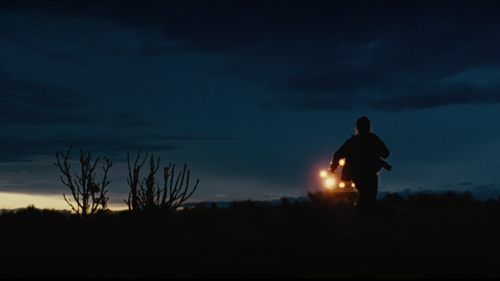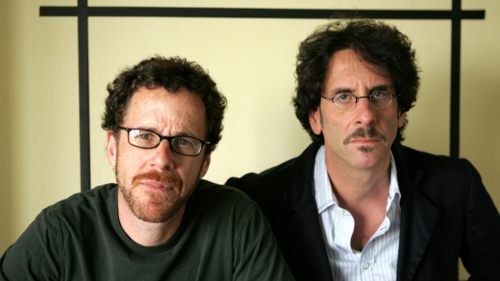NO COUNTRY FOR OLD MEN And Making Sense Of The Senseless
The crime you see now, it's hard to even take its measure. It's not that I'm afraid of it. I always knew you had to be willing to die to even do this job. But I don't want to push my chips forward and go out... meeting something I don't understand. A man would have to put his soul at hazard. He'd have to say 'OK. I'll be part of this world.'
Violence is inherently senseless - the only sense it's assigned is that we give to it to try and rationalize how and why, to make peace of this monstrous thing that's taken and shaken lives. Whatever sense is made of it, it doesn't belong to the perpetrators, whose reasoning stands on the dark, fearsome periphery of our own.
No Country For Old Men brings senseless violence to a small Texas town, pitting the coin toss and chance-driven logic of sociopath Anton Chigurh with the good ol' Sheriff Ed Tom Bell, one of those traditional strong and silent types who defends his tiny corner of the south with a gun and a badge. Bell figures he can hardly understand the violence that's emerged in recent years and the irrational quality of it, but there's a falsity to that reasoning and a sense of denial. In hindsight we make sense of what's happened and what's happened to us by repeating those stories to ourselves and other people, almost as if rehearsing a lie - but who are we trying to convince? In the moment - in the film's version of now - Bell can't grapple with what's been put in front of him. Like Bell, Chigurh is also rationalizing, using his coin tosses and concepts of fate and chance to justify the chaos he manufactures. Without men like Chigurh, life would run in a straight line.
Although the setting is dry and warm, the narrative of Joel and Ethan Coen's film is chilling. No Country For Old Men is the arid and sweaty sibling of Fargo, in which the Coens also explored similarly nihilistic concepts of senseless acts of violence and greed, of irrational men rationalizing their even more irrational actions. But No Country For Old Men is also sort of the inverse of Fargo - it's laconic where Fargo is talkative; Fargo uses almost grotesquely dark humor to illustrate the sociopathy of its characters, while No Country is sparse. Like Bell, the film is quiet and contemplative. Both films provoke with different tools and different means, but both films also meditate on chance and bloody consequence.
Based on the classic Cormac McCarthy novel of the same name, No Country For Old Men challenges us by marrying the dried-out and gritty west, a place where rational men dictate and take responsibility for their fate, with almost dream-like notions. Bell and Chigurh represent this jarring thematic marriage where there is simply no good or evil; instead, there is only fate and chance and whatever lies in between. But Chigurh's ideas about chance are as senseless as the violent acts he commits because chance shouldn't be dictated by the fingers of a man flipping a coin - chance should be dictated by the coin itself. As Llewelyn's wife Carla Jean defiantly explains to Chigurh later in the film, it's not up to the coin whether she lives or dies, it's up to the man flipping that coin, and he's already made up his mind. The same way Bell and his predecessors have tried for years to assign logic to that which is coldly illogical, Chigurh tries to assert control over the illusion of chance. He knows when he tosses that coin that it doesn't matter which side his prospective victims choose because he'll choose for them, asking them to deliver trust into that which only he knows and controls, asking them to trust his crazed benevolence.
Chigurh manipulates others into perceiving him as more than simply a man and a coin as more than a piece of metal, but as he tells the gas station attendant, it is just a coin and nothing more, really. It's only worth the value we place on it, just as these acts of violence are senseless until we assign some sense to them.


